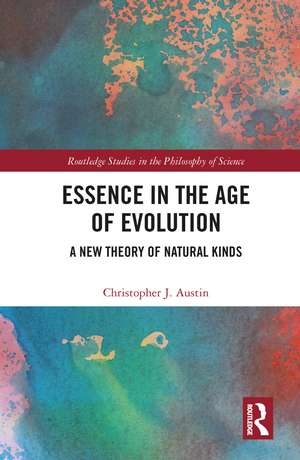Essence in the Age of Evolution: A New Theory of Natural Kinds: Routledge Studies in the Philosophy of Science
Autor Christopher J. Austinen Limba Engleză Paperback – 30 iun 2021
| Toate formatele și edițiile | Preț | Express |
|---|---|---|
| Paperback (1) | 380.07 lei 6-8 săpt. | |
| Taylor & Francis – 30 iun 2021 | 380.07 lei 6-8 săpt. | |
| Hardback (1) | 762.24 lei 6-8 săpt. | |
| Taylor & Francis – 20 sep 2018 | 762.24 lei 6-8 săpt. |
Din seria Routledge Studies in the Philosophy of Science
-
 Preț: 370.09 lei
Preț: 370.09 lei -
 Preț: 312.20 lei
Preț: 312.20 lei -
 Preț: 311.39 lei
Preț: 311.39 lei -
 Preț: 314.92 lei
Preț: 314.92 lei -
 Preț: 490.25 lei
Preț: 490.25 lei -
 Preț: 384.31 lei
Preț: 384.31 lei - 18%
 Preț: 897.52 lei
Preț: 897.52 lei - 18%
 Preț: 1118.82 lei
Preț: 1118.82 lei -
 Preț: 409.10 lei
Preț: 409.10 lei - 18%
 Preț: 999.64 lei
Preț: 999.64 lei - 18%
 Preț: 1001.70 lei
Preț: 1001.70 lei -
 Preț: 482.53 lei
Preț: 482.53 lei -
 Preț: 485.61 lei
Preț: 485.61 lei -
 Preț: 431.35 lei
Preț: 431.35 lei - 8%
 Preț: 398.45 lei
Preț: 398.45 lei -
 Preț: 356.64 lei
Preț: 356.64 lei -
 Preț: 389.66 lei
Preț: 389.66 lei -
 Preț: 341.75 lei
Preț: 341.75 lei - 14%
 Preț: 313.82 lei
Preț: 313.82 lei -
 Preț: 479.29 lei
Preț: 479.29 lei - 18%
 Preț: 1000.30 lei
Preț: 1000.30 lei -
 Preț: 383.89 lei
Preț: 383.89 lei -
 Preț: 384.86 lei
Preț: 384.86 lei -
 Preț: 428.74 lei
Preț: 428.74 lei -
 Preț: 482.56 lei
Preț: 482.56 lei -
 Preț: 395.47 lei
Preț: 395.47 lei -
 Preț: 433.26 lei
Preț: 433.26 lei - 20%
 Preț: 938.05 lei
Preț: 938.05 lei - 18%
 Preț: 1007.23 lei
Preț: 1007.23 lei -
 Preț: 443.65 lei
Preț: 443.65 lei
Preț: 380.07 lei
Nou
Puncte Express: 570
Preț estimativ în valută:
72.74€ • 75.66$ • 60.05£
72.74€ • 75.66$ • 60.05£
Carte tipărită la comandă
Livrare economică 15-29 aprilie
Preluare comenzi: 021 569.72.76
Specificații
ISBN-13: 9781032094755
ISBN-10: 1032094753
Pagini: 152
Dimensiuni: 152 x 229 x 13 mm
Greutate: 0.23 kg
Ediția:1
Editura: Taylor & Francis
Colecția Routledge
Seria Routledge Studies in the Philosophy of Science
Locul publicării:Oxford, United Kingdom
ISBN-10: 1032094753
Pagini: 152
Dimensiuni: 152 x 229 x 13 mm
Greutate: 0.23 kg
Ediția:1
Editura: Taylor & Francis
Colecția Routledge
Seria Routledge Studies in the Philosophy of Science
Locul publicării:Oxford, United Kingdom
Public țintă
Postgraduate and UndergraduateCuprins
Introduction
1. Biological Natural Kind Essentialism: Definitions & Desiderata
2. Essence and Explanation: Natural Kinds in the Taxonomic Tree
3. Powerfully Directed Development: A Dispositional Analysis of Ontogenesis
4. Ontogenetic Causal Primacy: The Fount and Flow of Information
5. The Essence of Natural Kinds: Unity in Diversity
6. An Evolutionary Ontology: Priority, Modality, and The Natural State
Conclusion
1. Biological Natural Kind Essentialism: Definitions & Desiderata
2. Essence and Explanation: Natural Kinds in the Taxonomic Tree
3. Powerfully Directed Development: A Dispositional Analysis of Ontogenesis
4. Ontogenetic Causal Primacy: The Fount and Flow of Information
5. The Essence of Natural Kinds: Unity in Diversity
6. An Evolutionary Ontology: Priority, Modality, and The Natural State
Conclusion
Recenzii
"This exciting book defends a controversial position: biological natural kind essentialism with a neo-Aristotelian twist. It makes an interesting, novel contribution to the metaphysics of natural kinds and is a great example of what work in scientifically-informed metaphysics, or the metaphysics of science, should look like." – Tuomas E. Tahko, University of Helsinki
"Christopher Austin’s Essence in the Age of Evolution has the ambitious and provocative aim of recovering the debate about essence by proposing a novel, neo-Aristotelian theory of ‘biological natural kind essentialism’, grounded in current research in evolutionary developmental biology. Christopher Austin embodies a trend of contemporary essentialism that shares with philosophers such as Denis Walsh (see his ‘Evolutionary essentialism’ (2006) in The British Journal for the Philosophy of Science 57: 425–448) a reaffirmation of Aristotle’s heritage and the idea that evolutionary biology has already proved anti-essentialism wrong. This book ...shows how philosophers are undertaking new and empirically-informed approaches to ancient philosophical problems...Austin’s book is conceived primarily as a contribution towards overcoming the dichotomy between evolution and essentialism. His intention to demystify essence is perhaps the aspect that makes this work unique."
- Silvia Basanta Martínez, History and Philosophy of the Life Sciences
"Christopher Austin’s Essence in the Age of Evolution has the ambitious and provocative aim of recovering the debate about essence by proposing a novel, neo-Aristotelian theory of ‘biological natural kind essentialism’, grounded in current research in evolutionary developmental biology. Christopher Austin embodies a trend of contemporary essentialism that shares with philosophers such as Denis Walsh (see his ‘Evolutionary essentialism’ (2006) in The British Journal for the Philosophy of Science 57: 425–448) a reaffirmation of Aristotle’s heritage and the idea that evolutionary biology has already proved anti-essentialism wrong. This book ...shows how philosophers are undertaking new and empirically-informed approaches to ancient philosophical problems...Austin’s book is conceived primarily as a contribution towards overcoming the dichotomy between evolution and essentialism. His intention to demystify essence is perhaps the aspect that makes this work unique."
- Silvia Basanta Martínez, History and Philosophy of the Life Sciences
Descriere
This book offers a defence of a highly contested philosophical position: biological natural kind essentialism. Austin challenges common objections to this theory, and in conjunction with contemporary scientific advancements within the field of evolutionary-developmental biology, he utilises a contemporary neo-Aristotelian metaphysics o
